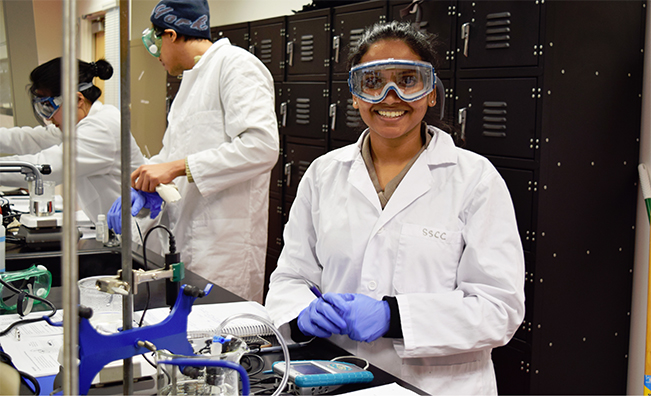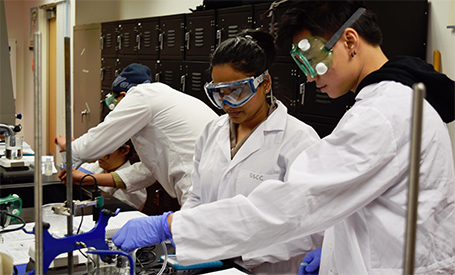The Ready-Set-Transfer Academy: Guidance. Mentorship. Research.

By 2018, it’s projected that 2.4 million science, technology, engineering and math (STEM)-related jobs will go unfilled in the US. These vital positions; from doctors and chemists to computer programmers and electricians, are the key to meeting the challenges of our growing technology-based global economy.
To help more college students see STEM careers as an accessible pathway for their future, South Seattle College established the Ready-Set-Transfer (RST) Academy in 2010. In collaboration with Seattle Central and North Seattle Colleges, the program is an effort to develop, recruit, and retain students in STEM fields, and guide them through the college transfer process.
RST, funded by a grant from the National Science Foundation, offers tools and support for three distinct student groups; “ready” students currently in developmental math courses who may not have considered a career in STEM, “set” students who are completing their core science courses, and “transfer” students finishing their associate degrees and preparing to transfer to four-year universities.
“STEM-related courses are often difficult for many students,” says Jake Ashcraft, a South chemistry instructor and head of South’s RST Academy. “They are very sequential, and very intensive. Beyond that, you must maintain good grades because at a university level these programs are very competitive, so we need to prepare our students and give them the resources they need to transfer.”

RST Academy student Meera Kandasamy hopes to pursue a career as a family practitioner after she graduates from South Seattle College
Guiding Students down a Pathway to Success
One way RST Academy prepares students for a future career in STEM is through the RST Speaker Series. Each quarter, successful professionals across several STEM disciples visit South to speak with RST students about their positions, and their own educational journeys. Past speakers include scientists from the Gates Foundation, engineers from Boeing, global health researchers and aerospace entrepreneurs.
The series also invites speakers from university admission offices and transfer application and personal statement experts, who help students be successful in the transfer process.
“The RST Speaker Series does two things,” says Jake. “First, students get to see what a day in the life of a STEM professional looks like. What a statistician does, for instance. And we’ve tried to get speakers who have been through the same struggles as many of our students have. Many that have gotten their start at community colleges. We also try to bring in speakers from diverse backgrounds so students can actually see someone who looks just like them represented in these fields.”
Although STEM-related jobs grew at three times the rate of non-STEM jobs in the last ten years, students of color are deeply underrepresented—just 2.2% of Latinos, 2.7% of African Americans, and 3.3% of Native Americans have earned a degree in STEM. One of the goals of RST Academy is welcoming students of all backgrounds who had not thought a career in STEM was achievable.
A Magnet for Mentorship
RST Academy students represent the majority of A.S. Transfer degree paths South offers. But some students, like Tommy Nguyen, 18, haven’t yet settled on a major or career path. As a participant in South’s Running Start program, at first Tommy wasn’t sure he would be accepted as a high schooler in a college program. RST Academy Faculty Mentor and South Math and Physics Instructor Rick Downs however, insisted Tommy try it out.
“I took a whole quarter to think about it, but being paired with Rick as my faculty mentor has been a really great experience,” says Tommy, who has since set his sights on a career in computational psychology. “He’s a great person to talk to if I have a question concerning math, career advice, and he’s been great at writing recommendation letters for the scholarships I’ve been applying to.”
Every RST Academy student is paired with a faculty mentor in line with their area of study at the beginning of their time in the program. Mentors meet with students at least twice a quarter and help guide them to the right classes, explain what majors they might pursue in a university, what events and speakers are coming to South as well as help with coursework and networking opportunities.
“The best part of the academy is the mentorship aspect,” says Tommy. “Professor Downs has always pushed me, provided support, given me opportunities, and suggested different ways of thinking about my work. To me, RST Academy is like a magnet. It attracts all these different people from across campus, tells them what they can do and keeps on pushing them to do more in their field.”
Research Opportunities at South and Beyond
For students like Meera Kandasamy, RST has helped her build a support system and networking connections on campus that are vital as she finishes her A.S. degree in biology and looks ahead to transferring, and then medical school.
Meera moved to Seattle with her husband and then two-month-old son from Toronto, Canada in 2013. As her husband started his job at Microsoft, Meera slowly began taking courses at North and South Seattle Colleges, and soon discovered a passion for science and technology.
She heard about RST Academy from South’s Women in STEM Club, and on acceptance started an undergraduate research program in bioengineering with Dr. Sepideh Hariri, PhD at the University of Washington Bothell.
“I worked in the bioengineering lab and we basically got to look at plants, particularly tomato leaves, and developed an in-depth understanding of their anatomy and physiology,” says Meera. “We calculated what the vein flow was, and used technology called OCT (optical coherence tomography) which takes a series of pictures which you can then make 3D models with.”
With RST Academy, faculty mentors frequently connect students with research opportunities both on and off campus. Research funding has already financed a student investigation and chemical analysis of the accelerants used in setting fires, and the creation of a computerized sensor network made from mini processors called “raspberry pies.”
Now in its seventh year at South, RST Academy has recently received a $5 million renewal from NSF. It’s shown that a student’s potential for a successful career in science, technology, engineering and math doesn’t just start at the steps of a four-year university.
“I think a lot of people that could be great at STEM, can start right here at a community college,” says Meera. “I don’t think I’ll be any less of a doctor because my path brought me here, and having the investment and guidance from RST Academy has helped me meet my goals.”
Interested in joining RST Academy?
Find out more at rst.seattlecolleges.edu/
STEM majors include astronomy, biology, botany, chemistry, computer science, engineering, geology, math, oceanography and physics.
Questions? Contact: albert.engel@seattlecolleges.edu
RST Academy Alumni
South Seattle College and RST Academy alumnus, David Yama, was one of 20 community-college students named to the 2015 All-USA Academic Team in recognition of top grades and inspiring personal stories.
Read about his journey